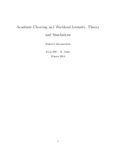| dc.rights.license | In Copyright | en_US |
| dc.creator | Marmorstein, Richard J. | |
| dc.date.accessioned | 2014-04-22T14:50:39Z | |
| dc.date.available | 2014-04-22T14:50:39Z | |
| dc.date.created | 2014 | |
| dc.identifier | WLURG38_Marmorstein_ECON_2014 | |
| dc.identifier.uri | http://hdl.handle.net/11021/27314 | |
| dc.description | Richard J. Marmorstein is a member of the Class of 2014 of Washington and Lee University. | en_US |
| dc.description | Capstone; [FULL-TEXT RESTRICTED TO WASHINGTON AND LEE UNIVERSITY LOGIN] | en_US |
| dc.description.abstract | In this project, I investigate a particular model of punishment featured by some honor codes -- a single sanction. Under a single-sanction honor code, the student judiciary must expel any student found guilty of academic dishonesty. The judiciary has no power to institute a lesser punishment, even for minor infractions. . . .
Past research has investigated a number of questions regarding honor codes and academic cheating. To what degree are honor codes effective in preventing cheating? Does this effect vary depending on characteristics of the institution, such as size or selectivity? Is an honor code more likely to prevent cheating by some types of students than others? I was unable to find any study examining specifically the effect of a single sanction. However, McCabe and Trevino (1993) survey students to report how severe they perceive their punishment will be if they are caught cheating --a related factor. [From Introduction] | en_US |
| dc.description.statementofresponsibility | Richard Marmorstein | |
| dc.format.extent | 30 pages | en_US |
| dc.language.iso | en_US | en_US |
| dc.rights | This material is made available for use in research, teaching, and private study, pursuant to U.S. Copyright law. The user assumes full responsibility for any use of the materials, including but not limited to, infringement of copyright and publication rights of reproduced materials. Any materials used should be fully credited with the source. | en_US |
| dc.rights.uri | http://rightsstatements.org/vocab/InC/1.0/ | en_US |
| dc.subject.other | Washington and Lee University -- Capstone in Economics | en_US |
| dc.title | Academic Cheating and Workload Intensity: Theory and Simulations | en_US |
| dc.type | Text | en_US |
| dcterms.isPartOf | RG38 - Student Papers | |
| dc.rights.holder | Marmorstein, Richard J. | |
| dc.subject.fast | Cheating (Education) | en_US |
| dc.subject.fast | Students--Academic workload | en_US |
| dc.subject.fast | Computer simulation | en_US |
| dc.subject.fast | Simulation methods | en_US |
| local.department | Economics | en_US |
| local.scholarshiptype | Capstone | en_US |
